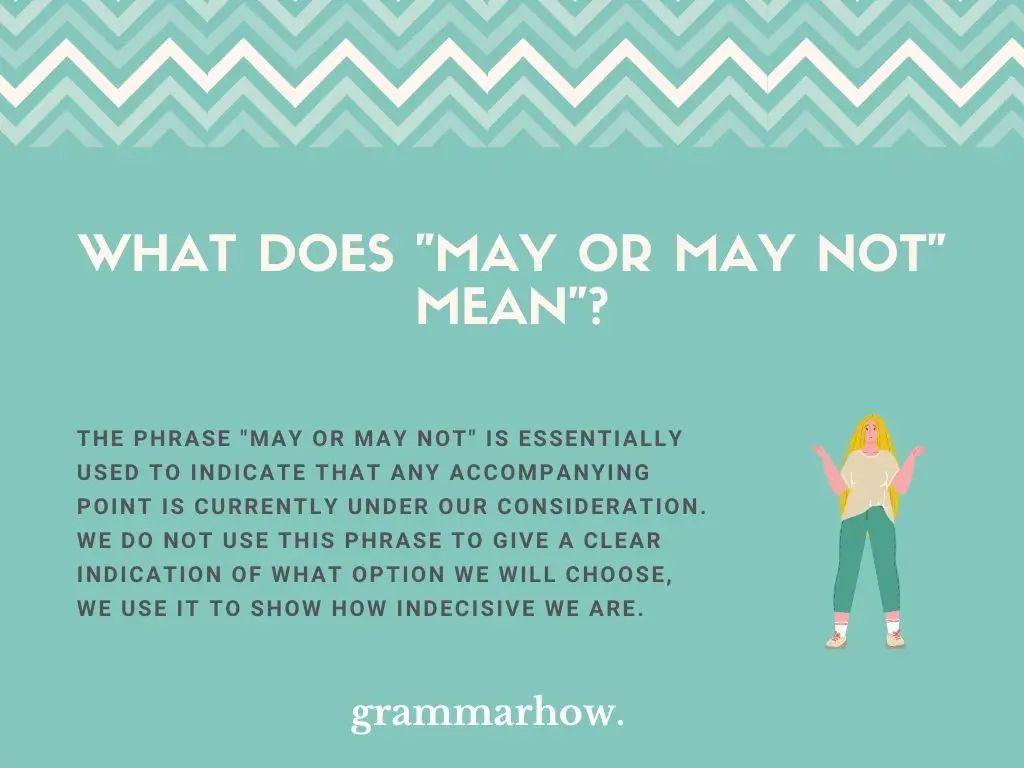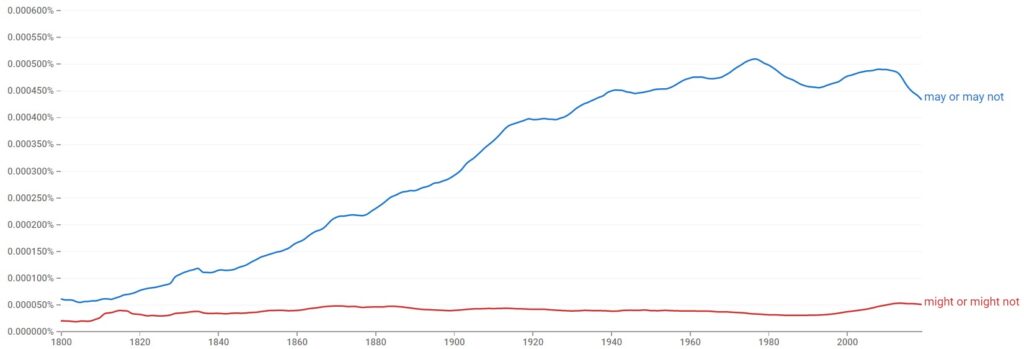We often say the phrase “may or may not” or perhaps, see it in novels or other written works. However, have you ever given much thought to whether or not this is proper to use? Because of this, this article will highlight all you need to know about this phrase.
What Does “May Or May Not” Mean”?
The phrase “may or may not” is essentially used to indicate that any accompanying point is currently under our consideration. We do not use this phrase to give a clear indication of what option we will choose, we use it to show how indecisive we are.

For example, if we say “I may or may not leave the party early”, we are expressing that the thought of leaving early is still under deep consideration. We are not saying that we will definitely be leaving early, nor are we saying that we will not leave early.
Therefore, we should consider the use of “may or may not” to be most appropriate when we are still debating between our decision, options, etc. It’s meant to showcase how indecisive we are and our overall state of mind – making it quite useful in certain circumstances.
Is “May Or May Not” Grammatically Correct?
Grammatically speaking, “may or may not” is considered a tautology – which is thought of as faults in speech or writing style. However, pragmatically speaking, when we choose to say or write this phrase, it does convey a specific meaning, which is to be highly undecided or unsure.
For additional clarity, a “tautology” is the use or saying of the same thing, in different terms. Tautologies are often thought of as faults in style because they can be viewed as redundant. Redundancy is not always seen as proper or appropriate in formal English speech or writing.
However, since the use of “may or may not” is viewed by many as conveying an appropriate meaning, if used correctly, the phrase can adequately describe our frame of thought or state of mind in a given moment.
Examples Of How To Use “May Or May Not” In A Sentence
We will now go over the following examples, that highlight the correct or appropriate use of the phrase “may or may not”:
- I may or may not go to bed early this evening, I just haven’t decided yet.
- I may or may not like scallop pasta, but I suppose I’ll have to try it in order to form an actual opinion.
- I may or may not be able to find the courage to tell him how I am feeling.
- I may or may not be able to get to sleep tonight.
- I may or may not go to her housewarming party.
- I may or may not have children someday when I am older.
- I may or may not go on vacation once the pandemic is over. I’m not certain how I will feel about travelling.
- I may or may not cut class tomorrow to go to the mall.
What Is The Difference Between “May” And “May Or May Not”?
Generally speaking, the term “may” is used to convey a strong possibility, or that something is quite likely to be accepted, to occur, etc. On the other hand, “may or may not” is used to convey confusion or indecision over something – where the outcome is impossible to guess.
Essentially, “may” can be seen as considered to convey more of a level of positivity, whereas “may or may not” conveys a 50/50 chance or outcome. This makes it so when we use “may or may not”, we are expressing that we are not aware if something is likely or unlikely.
Is “May Or May Not” Redundant?
Some folks consider “may or may not” redundant, as they view the individual terms “may” and “may not” as having the same meaning – which isn’t always the case. Most people consider “may” to be a rather positive term and “may not” to be a rather negative term.
For example, if we say “I may go to the party”, we are expressing a high likelihood that we will attend. However, if we say “I may not go to the party”, we are expressing the unlikelihood that we will attend. If we say “I may or may not go to the party”, we are expressing that we are unaware if we will or will not attend the party.
Therefore, “may or may not” is not always considered to be redundant because as we have discussed, it depicts that we are unsure of a result or of our decision. It merely depends on the proper context that this phrase is used in and the meaning we are intending to convey.
Is It Correct To Use “Might Or Might Not”?
We can use the phrase “might or might not” in a consistent manner to “may or may not”. However, it is important to keep in mind that the term “might” is often viewed as more appropriate when used in terms of the past tense.
We will use the phrase “might or might not” to also highlight out indecision or confusion over a choice we must make, the possible outcomes, etc.
As we can see when looking on Google Ngram Viewer, since the 1800s, the phrase “may or may not” has been used much more commonly than “might or might not”. Both have been in existence and used, however, “may or may not” is generally seen as the more proper and appropriate of the two phrases.


Martin holds a Master’s degree in Finance and International Business. He has six years of experience in professional communication with clients, executives, and colleagues. Furthermore, he has teaching experience from Aarhus University. Martin has been featured as an expert in communication and teaching on Forbes and Shopify. Read more about Martin here.

